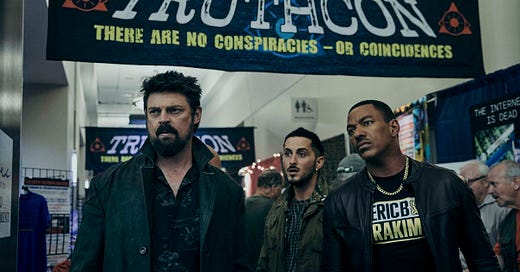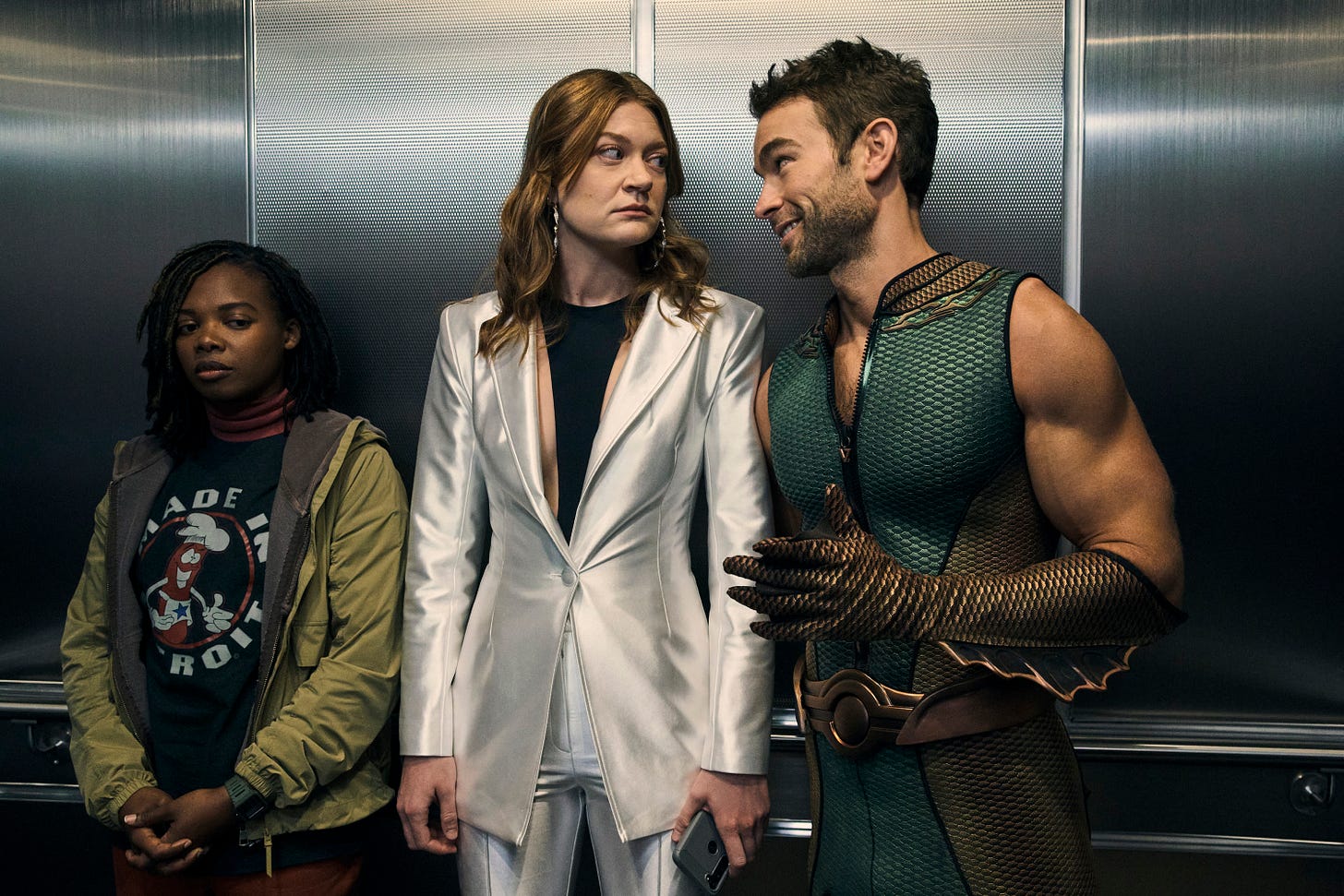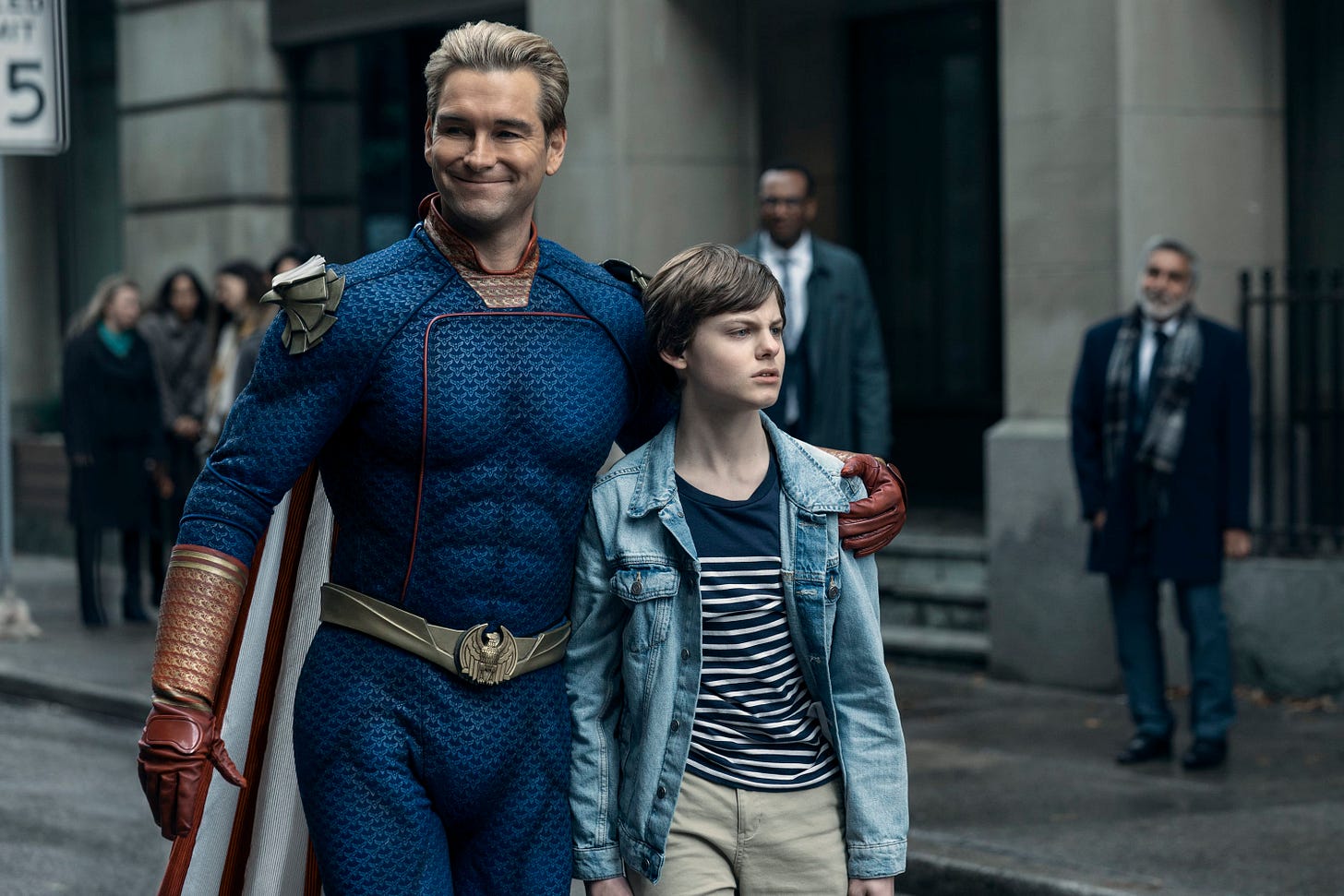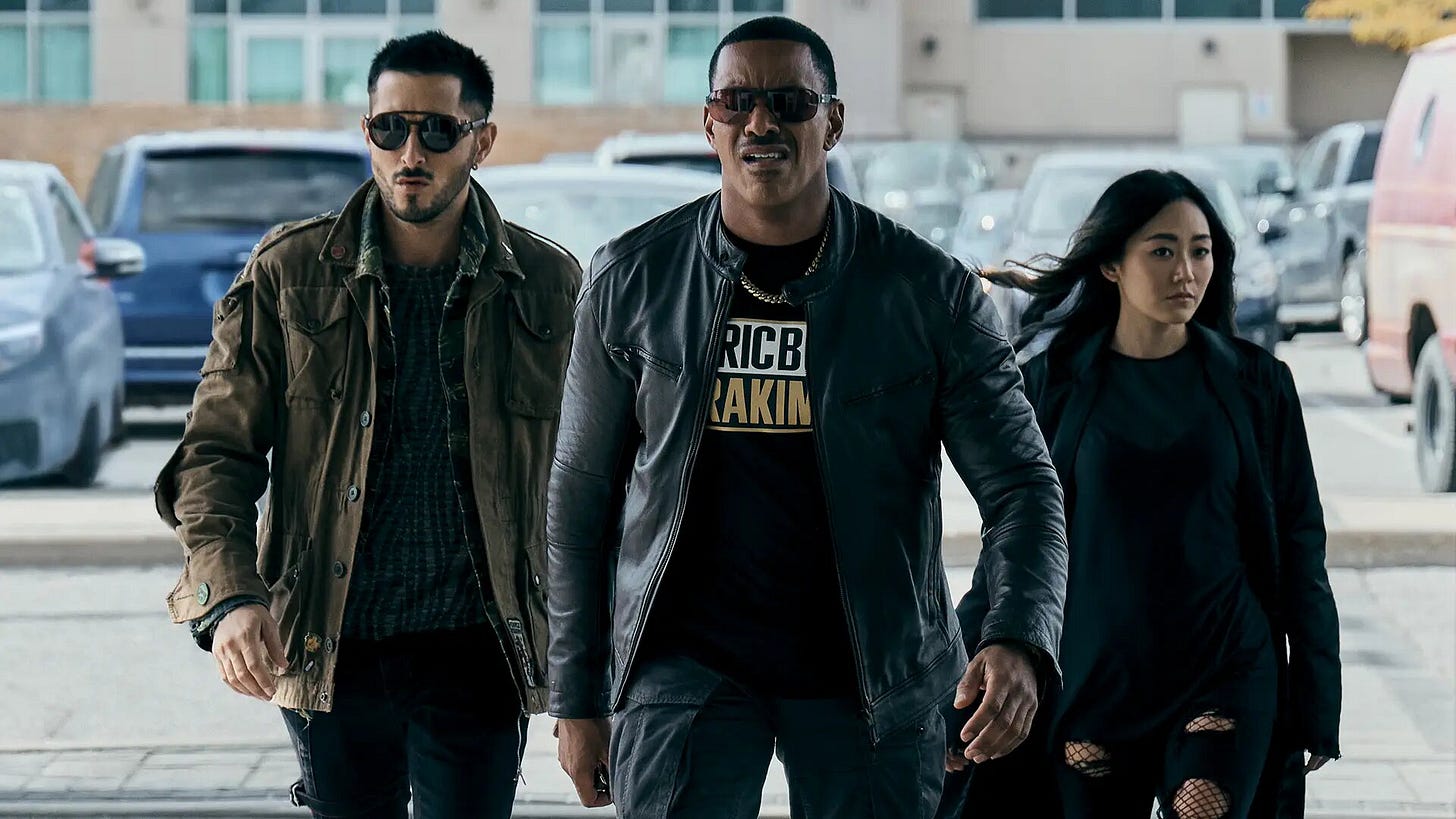The Boys gets filthier and funnier in a confident second episode
The pace slows down to really remind us how messed up all of our characters are
One of the reasons that The Boys is working so well after four seasons is because it continues to treat its characters with integrity. Someone like The Deep can obviously be bent towards complete silliness, but the writers are doing a great job at evolving him while making him the funniest he’s been in years. His rapid discovery of confidence after Sage’s advice both sets up his apparent arc of embracing a darker side of superiority, but it’s also just a hilarious moment (pick the funniest part of that sequence: Homelander’s frustrated, gritted-teeth response of “Shut the fuck up!” to The Deep’s genuine concern over whether he would have to kill again, or Ashley’s “Oh, so you’re fucking land animals now?” response to The Deep telling her what a capybara is). The Deep has been a comedic gold mine throughout all four seasons, but he’s especially firing on all cylinders this year with his unsteady, frat-bro confusion of his surroundings contrasted with his sudden anger and demands to be feared as a product of Homelander’s and Sage’s dark influences (it’s also easy to dismiss Chace Crawford’s talents, but his ability to make The Deep an endearingly pathetic characters deserves praise).
This treatment also applies to A-Train, who is already proving to be one of the season’s most compelling arcs. He was also one of last season’s major highlights, as we saw a shift from a narcissistic representation of corrupt celebrities to someone who is realizing his own emptiness. From the willing commodification of his identity as an African-American to his conflict with Blue Hawk, he finally realized that his own vanity and selfishness has driven everyone away. Both sides of that thread are continued in this episode; during Training A-Train (more on this later, we see his quiet realization that he is once again exploiting his identity and upbringing. His confrontation with his brother has him confront his own phoniness once more, but it stems from a personal perspective.
Of course it’s somber to see his brother drag his nephews away from him, but both motivations are earned in the situation. A-Train has screwed up too many times, and it makes sense that his brother wouldn’t want his kids around a bad influence masquerading as a hero. He does not want his kids idolizing a man who opposes everything he seems to stand for. On the other hand, it’s sad to see A-Train genuinely trying to bond with them, and once he’s reminded of his past, he sincerely realizes that he can never escape the mistakes that he has made. Jessie T. Usher plays this moment of quiet self-reflection in a nicely subdued fashion, as he understands that it’s too late to make proper amends. All of this makes his eventual aid to The Boys more satisfying; he is finally helping out in the one way he can and preventing the people that he hates the most from rising to even more power. After the first episode, the thought of A-Train possibly redeeming himself seemed completely unlikely. But the writers have genuinely done the work to earn this redemption arc, and I’m excited to see how this progresses throughout the season (though not to worry, Hughie and Starlight; we will never forget Robin and Supersonic).
The main meat of “Life Among the Septics” comes from the conflict between MM and Butcher. One of my favorite dialogue scenes in The Boys is from last season, in which Butcher recounts why he recruited MM to the team and tells him that “no matter how hard I’ve gotta be…you’re here to look after The Boys”. Aside from being a poignant scene, it added more history to their relationship and explained why MM stays with the team. However, after Butcher teamed up with Soldier Boy last season, constantly lied to MM, and has done some generally awful things for three seasons (let’s not forgot that he left The Boys for dead at the end of the first season), it makes perfect narrative sense why he’s fed up with Butcher, particularly after he finds out that he was hiding yet another secret about his mortality. But this decision hurts because of Butcher’s mentality this season; the writers are really allowing him to grow into a more selfless character this season who doesn’t want to manipulate people anymore.
That’s what makes Butcher’s final monologue so fantastic. We see him at a place of desperation that we rarely have before, as he sincerely admits that he has to live with all of his past regrets and pleads with MM to help him do one last thing right. It’s not only one of the season’s best scenes thus far, but it’s easily Karl Urban’s best work across these two episodes; he’s rarely allowed to drop his swaggering persona as he does here, and it enhances his beg to rejoin the team. MM’s reaction is all the more heartbreaking, yet understandable, because of Butcher’s vulnerability. The simple response of “Too fucking little, Butcher. Too fucking late.” is painful to see as a reaction to a selfless request, but it’s in-line with MM’s character. Similar to A-Train, Butcher can’t simply escape all of his past mistakes, and he’s betrayed his friend too many times to simply ask for forgiveness now.
Because even in this episode, Butcher still does some pretty terrible things. He keeps pushing MM to the edge, first by confessing that he’s dying six months too late (which was an authentic act of honesty on Butcher’s part, to be fair; he just didn’t fully consider the possibility that MM might be mad that he hid this from the team for so long). Then, he continues to interfere in a mission that MM doesn’t want him on, which leads to a later argument and brief beatdown (I won’t be as forgiving here; Butcher definitely deserved that punch for making a low blow about MM’s divorce). This conflict works because both of them are right in their own ways; Butcher is a dick, but he’s trying to do better. MM wants to lead this mission without collateral, but he makes some serious mistakes along the way. This clash in leadership styles brings out the differences in morality between the two and the kind of person needed to get the job done.
The Truth Con setting is another ripe opportunity for satire. Kripke and the rest of the writing team have proved time and time again that they have their finger on the pulse of America’s lunacy, and this convention is yet another opportunity for them to parody a wide range of modern conspiracy theorists. Deep state, Pizzagate, anti-vaxxers, elite pedophile rings: no stone goes unturned during this outrageous but sadly relevant gathering. The production design and writers work to smoothly blend these ideas into the setting of The Boys by including conspiracy theories and Easter eggs about this universe. Ideas about Stormfront and Soldier Boy may be easily missed, but they add more credibility to this world and the fusion of the show and reality.
Once again, the writers avoid settling for surface-level commentary through the new character Firecracker. Initially, she just seems like their in-universe answer for Alex Jones or any red-faced Youtube commentator who likes to constantly shout “woke” at the camera. However, her interaction with Sage reveals a deeper layer of insight to her character and this concept of Truth Con as a whole. She reveals that she perpetuates these beliefs because her viewers need something to believe in. They need something to fight for, and the belief that they are uncovering all of these lies and conspiracies gives them that purpose; she even states that it’s better for them to believe they are fighting a secret evil rather than believing that they are lonely outcasts who are looked down upon by the mainstream media. It’s a profound statement that is very similar to Stormfront’s message from season 2, and it’s especially relevant in today’s age, where these lonely and impressionable people are being weaponized by such political figures to be turned into devout supporters. Along with Sage, Firecracker is sure to be another great addition that will elevate the political commentary and further Homelander’s plot for a coup.
Speaking of which, Homelander and Ryan also get a pivotal storyline. This episode sees the beginning of Ryan’s indoctrination into The Seven, complete with an entertaining PR meeting that centers around Ryan’s image being prepared. It’s another funny look into corporate politics and the type of deliberation into these campaigns, particularly Sage’s reference to America’s obsession with white loners and the “chosen one”. Susan Heyward continues to play Sage with quiet menace, and her conflict with Ashley seems to be setting the stage for her takeover of Vought. It’s also interesting to see a behind-the-scenes look at the saves superheroes are tasked with, and the extensive phoniness of Vought. The presence of Ryan gives these scenes an extra weight, as it’s worse to see a naive child thrown into this system and realize that most of what he will do as a hero amounts to fake corporate politics.
From the first scene with Ryan and the stuntman, it was clear something would go wrong, and in usual The Boys fashion, it ends with someone exploding. Homelander is unable to not be the center of attention, even when his son is involved, so his forced appearance leads to Ryan becoming distressed and throwing the stuntman a bit too hard. The sequence as a whole is a bit unbalanced between trying to focus on the fumbled execution of the save and Ryan’s kill (I also think there should have been a little more distress from the public upon seeing a kid throw, as far as they know, a bank robber to be splattered into a wall, but maybe they’re all desensitized more than I’m giving them credit for). Where this plot shines the most is in the last scene between Homelander and Ryan, which sees Homelander try to comfort a traumatized Ryan without understanding, well, how to be human.
More than ever, Homelander has really been driving home how inferior he sees Homelander this season, epitomized by the repeated line “humans are just toys for our amusement”. He legitimately lacks the empathy to understand Ryan’s distress, and it angers him when he does. He wants to train him to see supes as superior beings and humans as insects that they can easily squash if they get in their way, and it’s this complete lack of regard for human life continues to peel back the psychopathy at Homelander’s core* (and of course he tries to comfort Ryan with a milkshake; he’s not like you, Homelander). After his smile at the end of last season, I didn’t want the writers to lean too hard into Ryan’s turn to the dark side and abandon the good-natured personality we saw before. I’m happy that they are consistently demonstrating how he’s torn between his need for a comforting father figure and his disgust for Vought’s lack of morals.
*I haven’t spent too much time on Antony Starr’s performance yet, mostly because I don’t want every recap to have a segment of me repeatedly showering praise on his phenomenal work. But hey, I may as well start now because he’s just too damn good. He consistently nails the subtle facial twitches that show his manufactured facade fading, and he similarly does a fantastic job at instantly twisting the phony smile plastered on his face into a look of contempt or frustration with those around him. He also nailed that last scene with Ryan, whether it was his hilariously creepy delivery of “Who wants a creamy, delicious milkshake?”, or him spitefully going back for the second milkshake after storming off.
I don’t have as much to say about the plots around the rest of The Boys, as we’re still mostly in the setup phase with them, but I’ll touch on them a little. Kimiko’s is the most successful of the hour, as she begins seeing a therapist who tells her that she must delve into her past to overcome it. This naturally starts to make her angry, but it eventually leads her to get drunk on the mission before an outburst when she sees conspiracy theories about child trafficking. Though we’ve seen her grapple with her past before, we haven’t seen much about Kimiko’s past as a child soldier; since the ending seems to hint that she will dive back into that part of her past, I think that could be a very interesting approach for her character. Though Hughie does get a short reunion with his mom, his focus is more around his own frustrations and insecurities about his sudden return. I’m sure we’ll see more emotional resonance from that arc going forward, but where he’s at makes sense for now.
Many fans already seem to be bored with Frenchie’s plotline. I wasn't the biggest fan of his story arc last season, but I’m liking where his story is going. Last season, they basically spelled out the fact that he and Kimiko had more of a familial bond than a romantic one, which is something that I’ve always assumed about them. I don’t mind that he has a new relationship, and the final reveal that Frenchie killed Colin’s family was the development that this arc needed. It adds a new tension to his discomfort with Colin, and it gives him a parallel to Kimiko’s discovery of his past that can be maintained throughout the season. Finally, Starlight gets to embrace her role as a public figure and accept the fact that her supporters need to hear her voice. As I said in the premiere, it’s a natural continuation of her character that allows her to stand on her own without relying on her fake, unneeded superhero persona.
Before I go, I realize I didn’t talk about what is sure to be the most-discussed part of the episode. While Frenchie and Kimiko are investigating Firecracker, they stumble upon her assistant, Splinter, doing some, um…well, let’s just say that those of you familiar with Human Centipede might have some idea. The creators seem insistent on continuously topping themselves in the NSFW department, and this breathtakingly filthy sight is on par with Termite’s tunnel of love and Herogasm as the most shocking thing they’ve done yet (I remain stunned at how much Amazon allows them to get away with). We might be reaching the point where the male nudity and gross-out gags may be reaching the point of becoming tired, but as this is the only major one of these two episodes, they haven’t completely lost their ability to shock, and they help to keep the raunchy, unpredictable spirit of the show alive.
This also leads to a fight between Splinter’s clones and The Boys. It’s not one of the show’s most memorable set pieces, but the amusing setting of a Marvelous Mrs. Maisel-themed bar mitzvah, and the sight of a bunch of nude clones swarming MM made for some welcome chaos. It’s also always nice to get a crowbar back into Butcher’s ruthless hands. As long as The Boys continues to provide steady depth underneath these sequences, which “Life Among the Septics” does, then by all means, let’s keep the carnage coming.
Grade: A-
Stray Observations
Training A-Train was amazing. Just amazing. They always nail the fake movie productions, but this one was perfect at nailing the cliches of black biopics and the stereotypes they needed A-Train to fit into. Plus, Will Ferrell was one of the show’s best cameos to date (his delivery of “slinging ya-yo for gangbangers” was Oscar-worthy, indeed).
I like this new Black Noir. He’s a nice change of pace from the original, and they’re using him just enough to make his desperate requests for any performance directions quite funny.
Fun fact 1: In the comics, Garth Ennis designed Hughie to look like Simon Pegg. Since he was older by the time the show came out, they cast Pegg as Hughie’s dad as a nod to the source material.
Fun fact 2: The stuntman, Koy, is named after and played by the show’s real-life, Emmy-winning stunt coordinator John Koyama.
“I swear to God. Stupid people who think they’re smart make me want to eat my own shit!”
Homelander has yet to kill someone with his powers this season. Progress?
Why didn’t The Boys just go after Firecracker when she ran away? I get that they didn’t have anything to do with her specifically, but as she was trying to kill them, it would probably have been best to take care of her then and there.
We got some great “ois” from Butcher in this episode.






